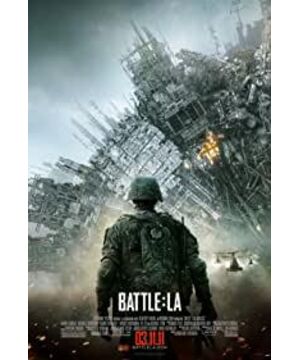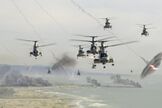Part1: About the movie.
I thought it was hard to come up with a "blockbuster" "BATTLE LOS ANGELES", and I waited for it for a long time and finally it was released in China today. After reading it, I decided to put the word "blockbuster" in quotation marks.
The setting is indeed quite big, but after reading it, you know that it is another cut corner. The big scenes of thousands of people, the destruction of the world, and the city battles, tell you: there is no such thing as... the headquarters is taken, and the explanation is finished in two sentences. can not see. There are only a few people jumping around the whole time, and thousands of other people are just numbers on the background TV. Just like when Hong Kong and Japan shoot war scenes, they say it is a battlefield with tens of thousands of people, but when the camera rolls around, there are only a dozen people waving and shouting... save money!
But then again, a dead skinny camel is bigger than a horse. No matter how people cut corners, they are much more refined than the so-called real big scenes made in China. At least the scenes of those few people are full of energy. Being able to show the battle of a few people in a big scene with thousands of people also requires a solid foundation! Saving costs, exhausting the director...
Conclusion: The movie itself is worth watching. Not a first-class masterpiece, but definitely worth a movie ticket + Coke popcorn.
Part2: About impressions.
Japanese big river dramas can't shoot big scenes, so they focus on literary dramas, and people play with connotations. Since "BATTLE LOS ANGELES" has also decided to save the battlefield budget, it is natural to add more shots to the interior.
So it's odd that in an Earthlings vs. Aliens sci-fi, the discussion of leadership goes on all the time. However, it is said that the market is like a battlefield. I still think that the leadership theory on the battlefield is quite in line with management. But it may also be that those guys have moved their workplace thinking to the battlefield to interpret it. Who knows, I have never been on the battlefield...
The film tells us that as a leader, we must make commitments, make decisions, and be held accountable for them. But in fact, in the ever-changing battlefield, everyone is an ordinary mortal. Even his own life is gone, and he keeps making promises to other people's lives and taking responsibility for it? Looks like a joke. This is no joke. As a leader, you have to! Even if you are ignorant of the previous situation and have absolutely no control over the development of the situation, you must make a decision, and even the wrong decision is better than no decision at all.
"It doesn't matter whether you choose the left or the right, what matters is that you have to make a decision, and we will firmly implement it." The
team believes in the leader and obeys the leader. Once the leader makes a decision, the team will resolutely implement it, even if it accelerates its own perish. Why do this? It's very simple: if there is no decision, there is only failure to wait; and as long as a decision is made, there is still hope of success!
Just like when you travel abroad, you will always encounter various situations. Once there is a problem, we must go all out to solve it, find a way, and act. Maybe you haven't thought of the best way, but as long as you do it, there is a chance of success more or less; and if you encounter a problem and panic, hesitate, and fear, there is no possibility of solving the problem, and there is only a dead end.
Choice is more important than effort, persistence is more important than choice.
So the content of the decision is not the key, the key is to make the decision and stick to it until it is successful!
This is the awareness that a leader should have.
View more about Battle Los Angeles reviews











